Taxation Law Application - Assignment
VerifiedAdded on 2021/06/14
|10
|1592
|107
AI Summary
Contribute Materials
Your contribution can guide someone’s learning journey. Share your
documents today.
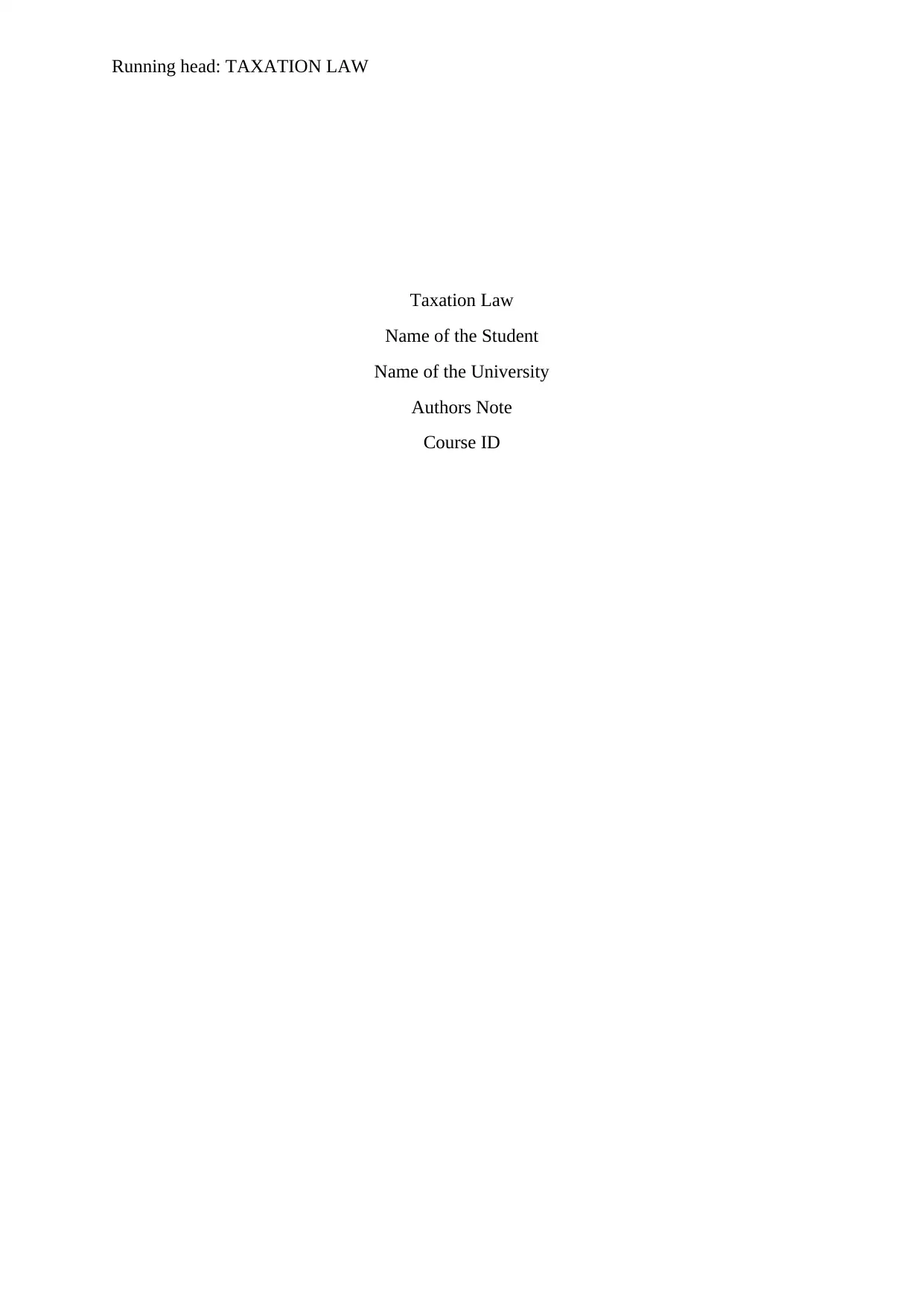
Running head: TAXATION LAW
Taxation Law
Name of the Student
Name of the University
Authors Note
Course ID
Taxation Law
Name of the Student
Name of the University
Authors Note
Course ID
Secure Best Marks with AI Grader
Need help grading? Try our AI Grader for instant feedback on your assignments.
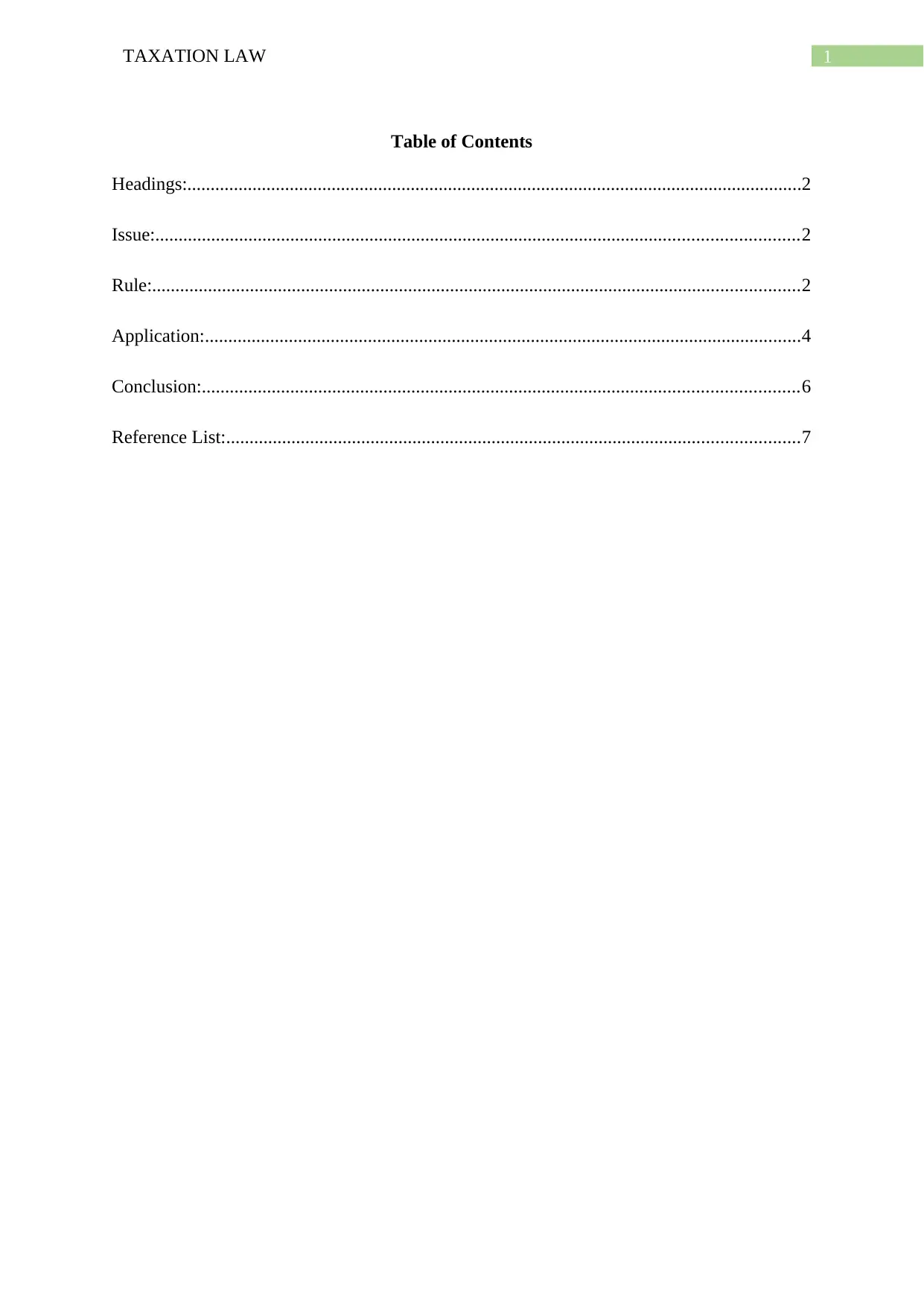
1TAXATION LAW
Table of Contents
Headings:....................................................................................................................................2
Issue:..........................................................................................................................................2
Rule:...........................................................................................................................................2
Application:................................................................................................................................4
Conclusion:................................................................................................................................6
Reference List:...........................................................................................................................7
Table of Contents
Headings:....................................................................................................................................2
Issue:..........................................................................................................................................2
Rule:...........................................................................................................................................2
Application:................................................................................................................................4
Conclusion:................................................................................................................................6
Reference List:...........................................................................................................................7
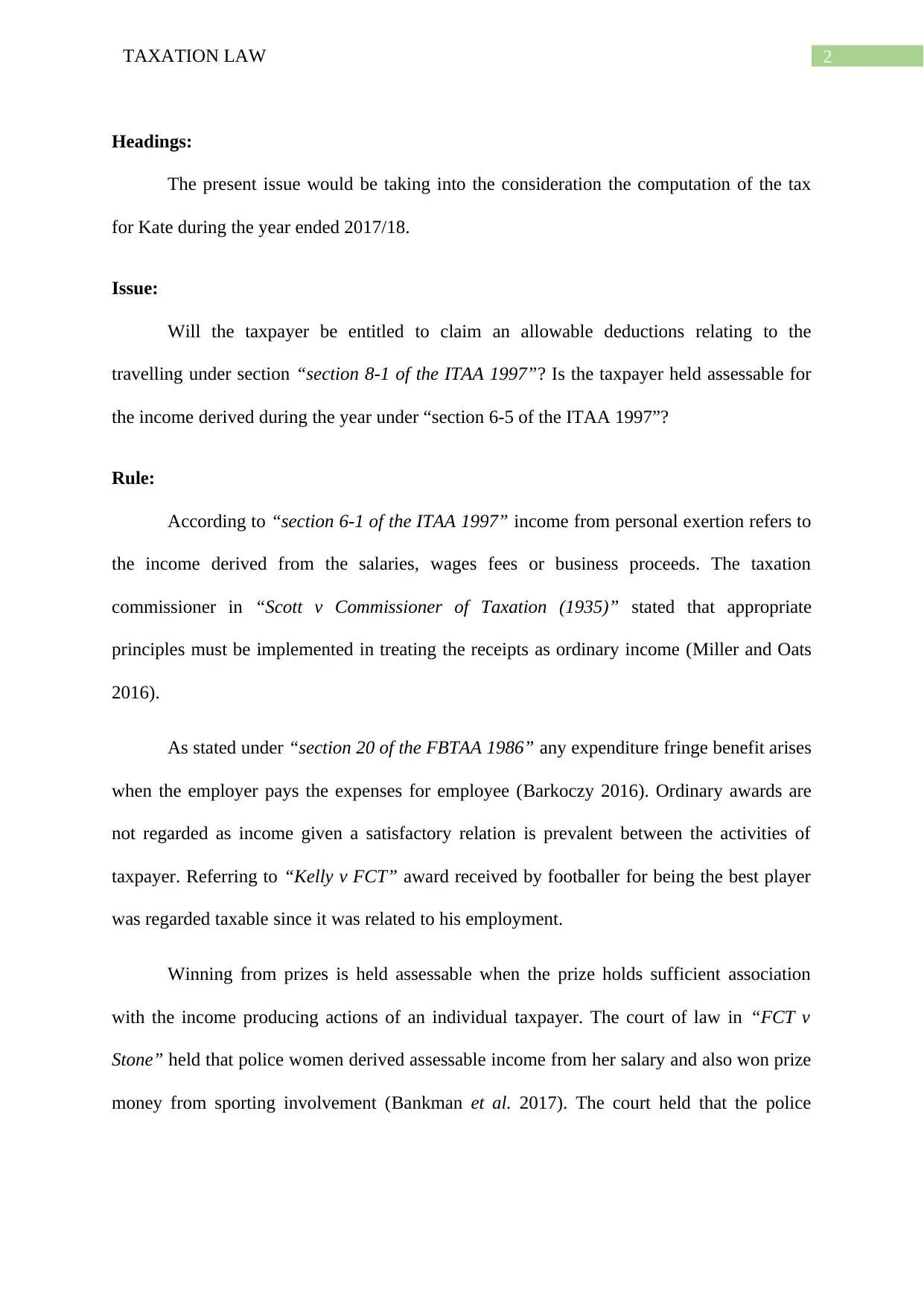
2TAXATION LAW
Headings:
The present issue would be taking into the consideration the computation of the tax
for Kate during the year ended 2017/18.
Issue:
Will the taxpayer be entitled to claim an allowable deductions relating to the
travelling under section “section 8-1 of the ITAA 1997”? Is the taxpayer held assessable for
the income derived during the year under “section 6-5 of the ITAA 1997”?
Rule:
According to “section 6-1 of the ITAA 1997” income from personal exertion refers to
the income derived from the salaries, wages fees or business proceeds. The taxation
commissioner in “Scott v Commissioner of Taxation (1935)” stated that appropriate
principles must be implemented in treating the receipts as ordinary income (Miller and Oats
2016).
As stated under “section 20 of the FBTAA 1986” any expenditure fringe benefit arises
when the employer pays the expenses for employee (Barkoczy 2016). Ordinary awards are
not regarded as income given a satisfactory relation is prevalent between the activities of
taxpayer. Referring to “Kelly v FCT” award received by footballer for being the best player
was regarded taxable since it was related to his employment.
Winning from prizes is held assessable when the prize holds sufficient association
with the income producing actions of an individual taxpayer. The court of law in “FCT v
Stone” held that police women derived assessable income from her salary and also won prize
money from sporting involvement (Bankman et al. 2017). The court held that the police
Headings:
The present issue would be taking into the consideration the computation of the tax
for Kate during the year ended 2017/18.
Issue:
Will the taxpayer be entitled to claim an allowable deductions relating to the
travelling under section “section 8-1 of the ITAA 1997”? Is the taxpayer held assessable for
the income derived during the year under “section 6-5 of the ITAA 1997”?
Rule:
According to “section 6-1 of the ITAA 1997” income from personal exertion refers to
the income derived from the salaries, wages fees or business proceeds. The taxation
commissioner in “Scott v Commissioner of Taxation (1935)” stated that appropriate
principles must be implemented in treating the receipts as ordinary income (Miller and Oats
2016).
As stated under “section 20 of the FBTAA 1986” any expenditure fringe benefit arises
when the employer pays the expenses for employee (Barkoczy 2016). Ordinary awards are
not regarded as income given a satisfactory relation is prevalent between the activities of
taxpayer. Referring to “Kelly v FCT” award received by footballer for being the best player
was regarded taxable since it was related to his employment.
Winning from prizes is held assessable when the prize holds sufficient association
with the income producing actions of an individual taxpayer. The court of law in “FCT v
Stone” held that police women derived assessable income from her salary and also won prize
money from sporting involvement (Bankman et al. 2017). The court held that the police
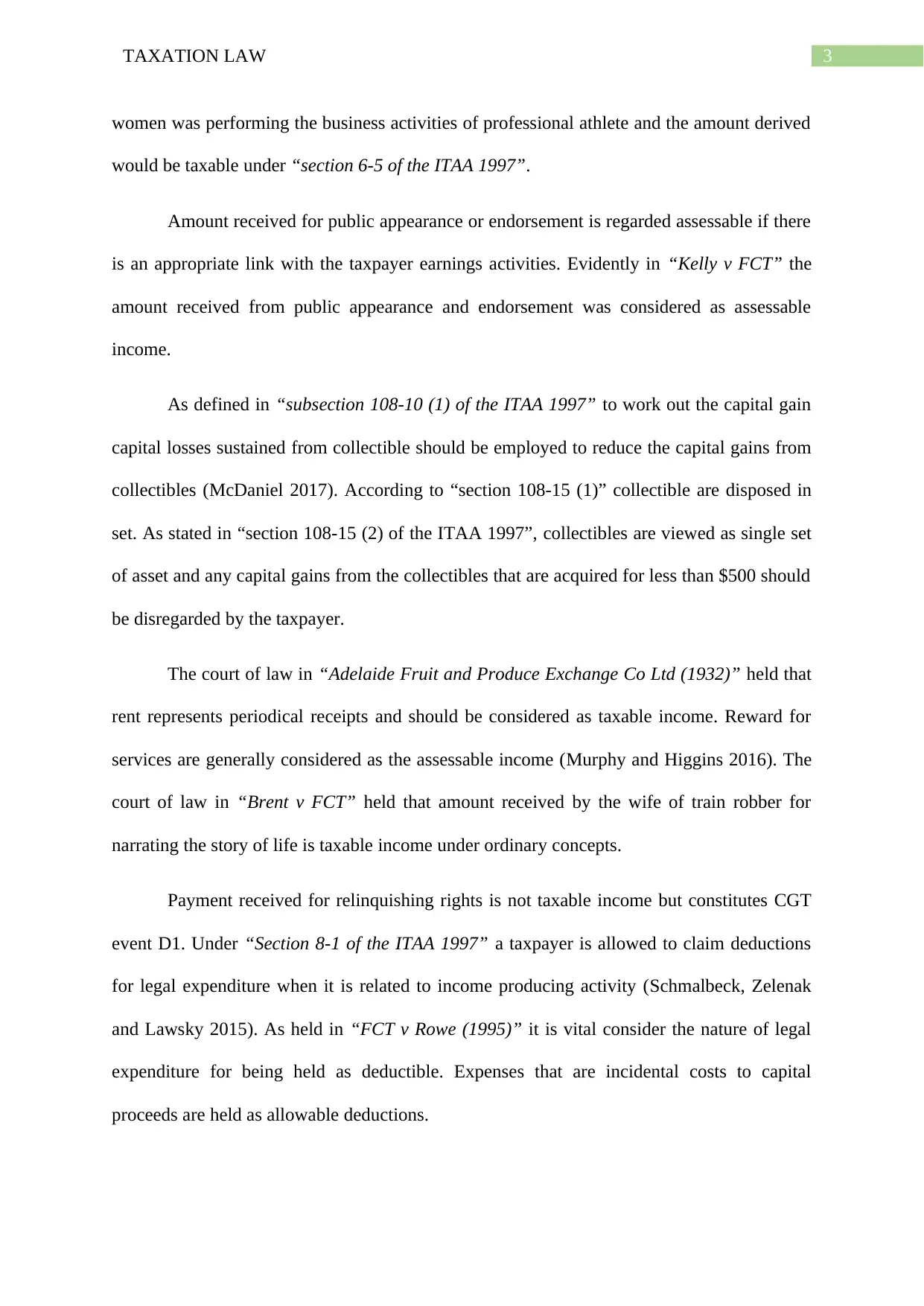
3TAXATION LAW
women was performing the business activities of professional athlete and the amount derived
would be taxable under “section 6-5 of the ITAA 1997”.
Amount received for public appearance or endorsement is regarded assessable if there
is an appropriate link with the taxpayer earnings activities. Evidently in “Kelly v FCT” the
amount received from public appearance and endorsement was considered as assessable
income.
As defined in “subsection 108-10 (1) of the ITAA 1997” to work out the capital gain
capital losses sustained from collectible should be employed to reduce the capital gains from
collectibles (McDaniel 2017). According to “section 108-15 (1)” collectible are disposed in
set. As stated in “section 108-15 (2) of the ITAA 1997”, collectibles are viewed as single set
of asset and any capital gains from the collectibles that are acquired for less than $500 should
be disregarded by the taxpayer.
The court of law in “Adelaide Fruit and Produce Exchange Co Ltd (1932)” held that
rent represents periodical receipts and should be considered as taxable income. Reward for
services are generally considered as the assessable income (Murphy and Higgins 2016). The
court of law in “Brent v FCT” held that amount received by the wife of train robber for
narrating the story of life is taxable income under ordinary concepts.
Payment received for relinquishing rights is not taxable income but constitutes CGT
event D1. Under “Section 8-1 of the ITAA 1997” a taxpayer is allowed to claim deductions
for legal expenditure when it is related to income producing activity (Schmalbeck, Zelenak
and Lawsky 2015). As held in “FCT v Rowe (1995)” it is vital consider the nature of legal
expenditure for being held as deductible. Expenses that are incidental costs to capital
proceeds are held as allowable deductions.
women was performing the business activities of professional athlete and the amount derived
would be taxable under “section 6-5 of the ITAA 1997”.
Amount received for public appearance or endorsement is regarded assessable if there
is an appropriate link with the taxpayer earnings activities. Evidently in “Kelly v FCT” the
amount received from public appearance and endorsement was considered as assessable
income.
As defined in “subsection 108-10 (1) of the ITAA 1997” to work out the capital gain
capital losses sustained from collectible should be employed to reduce the capital gains from
collectibles (McDaniel 2017). According to “section 108-15 (1)” collectible are disposed in
set. As stated in “section 108-15 (2) of the ITAA 1997”, collectibles are viewed as single set
of asset and any capital gains from the collectibles that are acquired for less than $500 should
be disregarded by the taxpayer.
The court of law in “Adelaide Fruit and Produce Exchange Co Ltd (1932)” held that
rent represents periodical receipts and should be considered as taxable income. Reward for
services are generally considered as the assessable income (Murphy and Higgins 2016). The
court of law in “Brent v FCT” held that amount received by the wife of train robber for
narrating the story of life is taxable income under ordinary concepts.
Payment received for relinquishing rights is not taxable income but constitutes CGT
event D1. Under “Section 8-1 of the ITAA 1997” a taxpayer is allowed to claim deductions
for legal expenditure when it is related to income producing activity (Schmalbeck, Zelenak
and Lawsky 2015). As held in “FCT v Rowe (1995)” it is vital consider the nature of legal
expenditure for being held as deductible. Expenses that are incidental costs to capital
proceeds are held as allowable deductions.
Secure Best Marks with AI Grader
Need help grading? Try our AI Grader for instant feedback on your assignments.
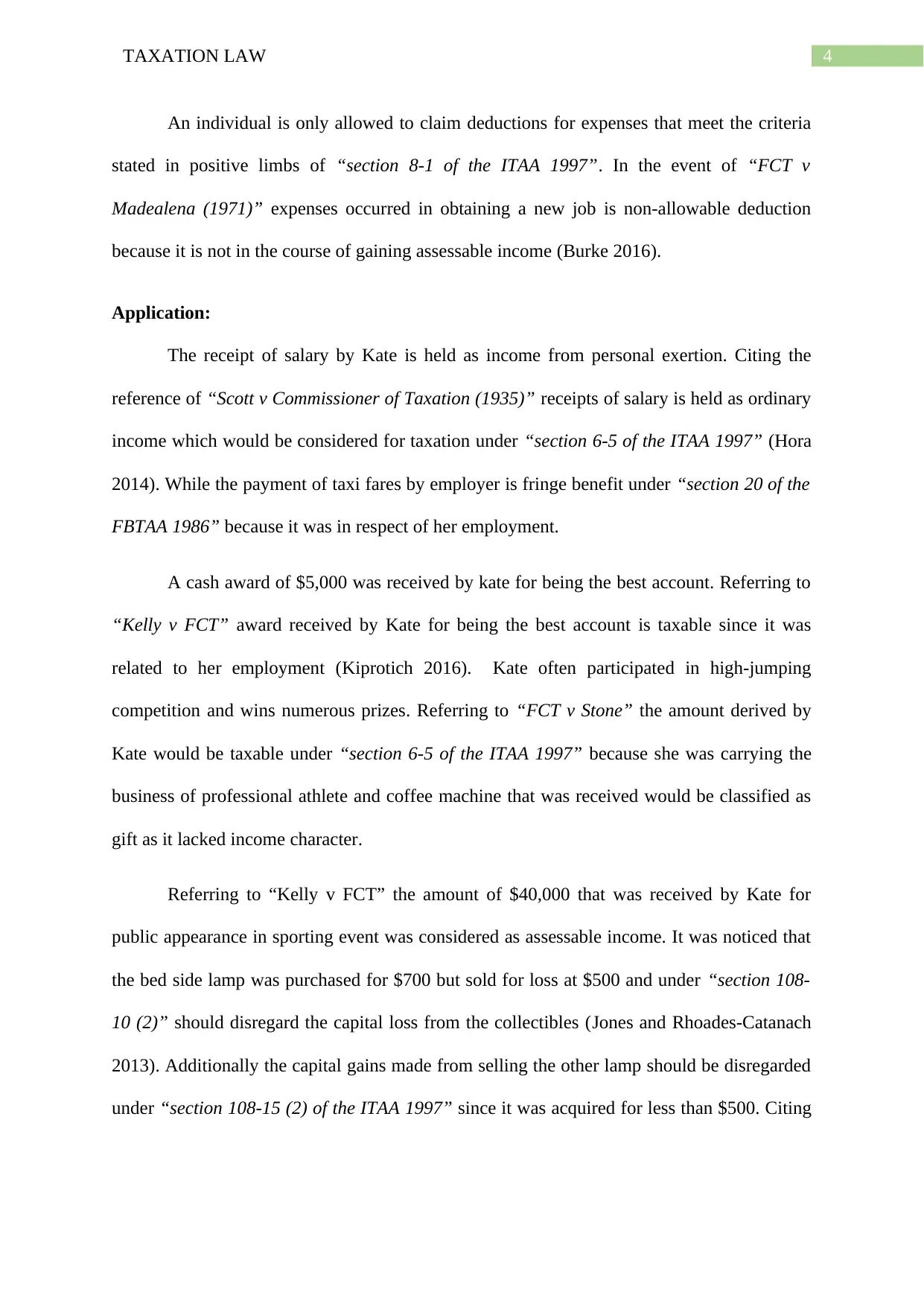
4TAXATION LAW
An individual is only allowed to claim deductions for expenses that meet the criteria
stated in positive limbs of “section 8-1 of the ITAA 1997”. In the event of “FCT v
Madealena (1971)” expenses occurred in obtaining a new job is non-allowable deduction
because it is not in the course of gaining assessable income (Burke 2016).
Application:
The receipt of salary by Kate is held as income from personal exertion. Citing the
reference of “Scott v Commissioner of Taxation (1935)” receipts of salary is held as ordinary
income which would be considered for taxation under “section 6-5 of the ITAA 1997” (Hora
2014). While the payment of taxi fares by employer is fringe benefit under “section 20 of the
FBTAA 1986” because it was in respect of her employment.
A cash award of $5,000 was received by kate for being the best account. Referring to
“Kelly v FCT” award received by Kate for being the best account is taxable since it was
related to her employment (Kiprotich 2016). Kate often participated in high-jumping
competition and wins numerous prizes. Referring to “FCT v Stone” the amount derived by
Kate would be taxable under “section 6-5 of the ITAA 1997” because she was carrying the
business of professional athlete and coffee machine that was received would be classified as
gift as it lacked income character.
Referring to “Kelly v FCT” the amount of $40,000 that was received by Kate for
public appearance in sporting event was considered as assessable income. It was noticed that
the bed side lamp was purchased for $700 but sold for loss at $500 and under “section 108-
10 (2)” should disregard the capital loss from the collectibles (Jones and Rhoades-Catanach
2013). Additionally the capital gains made from selling the other lamp should be disregarded
under “section 108-15 (2) of the ITAA 1997” since it was acquired for less than $500. Citing
An individual is only allowed to claim deductions for expenses that meet the criteria
stated in positive limbs of “section 8-1 of the ITAA 1997”. In the event of “FCT v
Madealena (1971)” expenses occurred in obtaining a new job is non-allowable deduction
because it is not in the course of gaining assessable income (Burke 2016).
Application:
The receipt of salary by Kate is held as income from personal exertion. Citing the
reference of “Scott v Commissioner of Taxation (1935)” receipts of salary is held as ordinary
income which would be considered for taxation under “section 6-5 of the ITAA 1997” (Hora
2014). While the payment of taxi fares by employer is fringe benefit under “section 20 of the
FBTAA 1986” because it was in respect of her employment.
A cash award of $5,000 was received by kate for being the best account. Referring to
“Kelly v FCT” award received by Kate for being the best account is taxable since it was
related to her employment (Kiprotich 2016). Kate often participated in high-jumping
competition and wins numerous prizes. Referring to “FCT v Stone” the amount derived by
Kate would be taxable under “section 6-5 of the ITAA 1997” because she was carrying the
business of professional athlete and coffee machine that was received would be classified as
gift as it lacked income character.
Referring to “Kelly v FCT” the amount of $40,000 that was received by Kate for
public appearance in sporting event was considered as assessable income. It was noticed that
the bed side lamp was purchased for $700 but sold for loss at $500 and under “section 108-
10 (2)” should disregard the capital loss from the collectibles (Jones and Rhoades-Catanach
2013). Additionally the capital gains made from selling the other lamp should be disregarded
under “section 108-15 (2) of the ITAA 1997” since it was acquired for less than $500. Citing
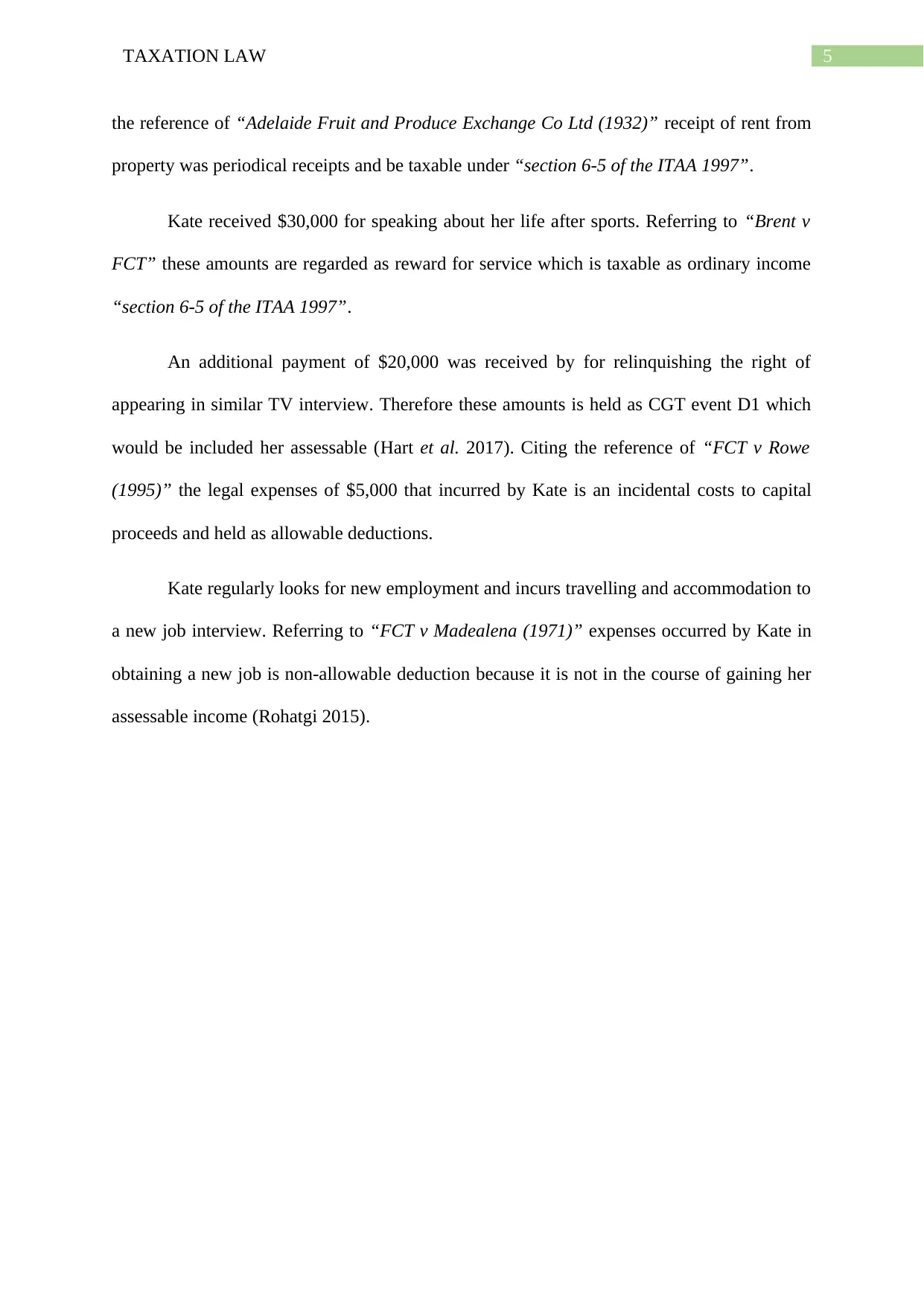
5TAXATION LAW
the reference of “Adelaide Fruit and Produce Exchange Co Ltd (1932)” receipt of rent from
property was periodical receipts and be taxable under “section 6-5 of the ITAA 1997”.
Kate received $30,000 for speaking about her life after sports. Referring to “Brent v
FCT” these amounts are regarded as reward for service which is taxable as ordinary income
“section 6-5 of the ITAA 1997”.
An additional payment of $20,000 was received by for relinquishing the right of
appearing in similar TV interview. Therefore these amounts is held as CGT event D1 which
would be included her assessable (Hart et al. 2017). Citing the reference of “FCT v Rowe
(1995)” the legal expenses of $5,000 that incurred by Kate is an incidental costs to capital
proceeds and held as allowable deductions.
Kate regularly looks for new employment and incurs travelling and accommodation to
a new job interview. Referring to “FCT v Madealena (1971)” expenses occurred by Kate in
obtaining a new job is non-allowable deduction because it is not in the course of gaining her
assessable income (Rohatgi 2015).
the reference of “Adelaide Fruit and Produce Exchange Co Ltd (1932)” receipt of rent from
property was periodical receipts and be taxable under “section 6-5 of the ITAA 1997”.
Kate received $30,000 for speaking about her life after sports. Referring to “Brent v
FCT” these amounts are regarded as reward for service which is taxable as ordinary income
“section 6-5 of the ITAA 1997”.
An additional payment of $20,000 was received by for relinquishing the right of
appearing in similar TV interview. Therefore these amounts is held as CGT event D1 which
would be included her assessable (Hart et al. 2017). Citing the reference of “FCT v Rowe
(1995)” the legal expenses of $5,000 that incurred by Kate is an incidental costs to capital
proceeds and held as allowable deductions.
Kate regularly looks for new employment and incurs travelling and accommodation to
a new job interview. Referring to “FCT v Madealena (1971)” expenses occurred by Kate in
obtaining a new job is non-allowable deduction because it is not in the course of gaining her
assessable income (Rohatgi 2015).
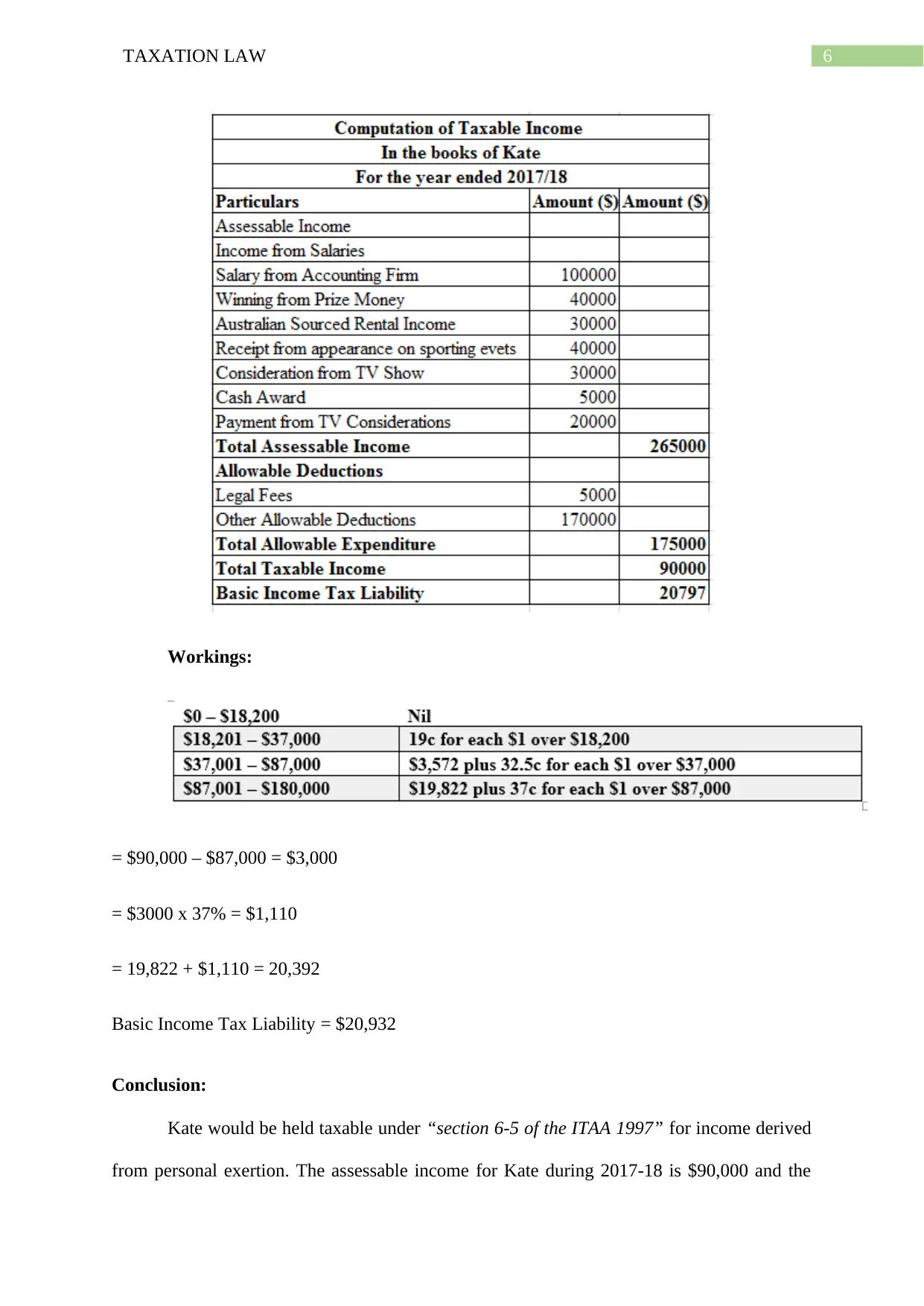
6TAXATION LAW
Workings:
= $90,000 – $87,000 = $3,000
= $3000 x 37% = $1,110
= 19,822 + $1,110 = 20,392
Basic Income Tax Liability = $20,932
Conclusion:
Kate would be held taxable under “section 6-5 of the ITAA 1997” for income derived
from personal exertion. The assessable income for Kate during 2017-18 is $90,000 and the
Workings:
= $90,000 – $87,000 = $3,000
= $3000 x 37% = $1,110
= 19,822 + $1,110 = 20,392
Basic Income Tax Liability = $20,932
Conclusion:
Kate would be held taxable under “section 6-5 of the ITAA 1997” for income derived
from personal exertion. The assessable income for Kate during 2017-18 is $90,000 and the
Paraphrase This Document
Need a fresh take? Get an instant paraphrase of this document with our AI Paraphraser
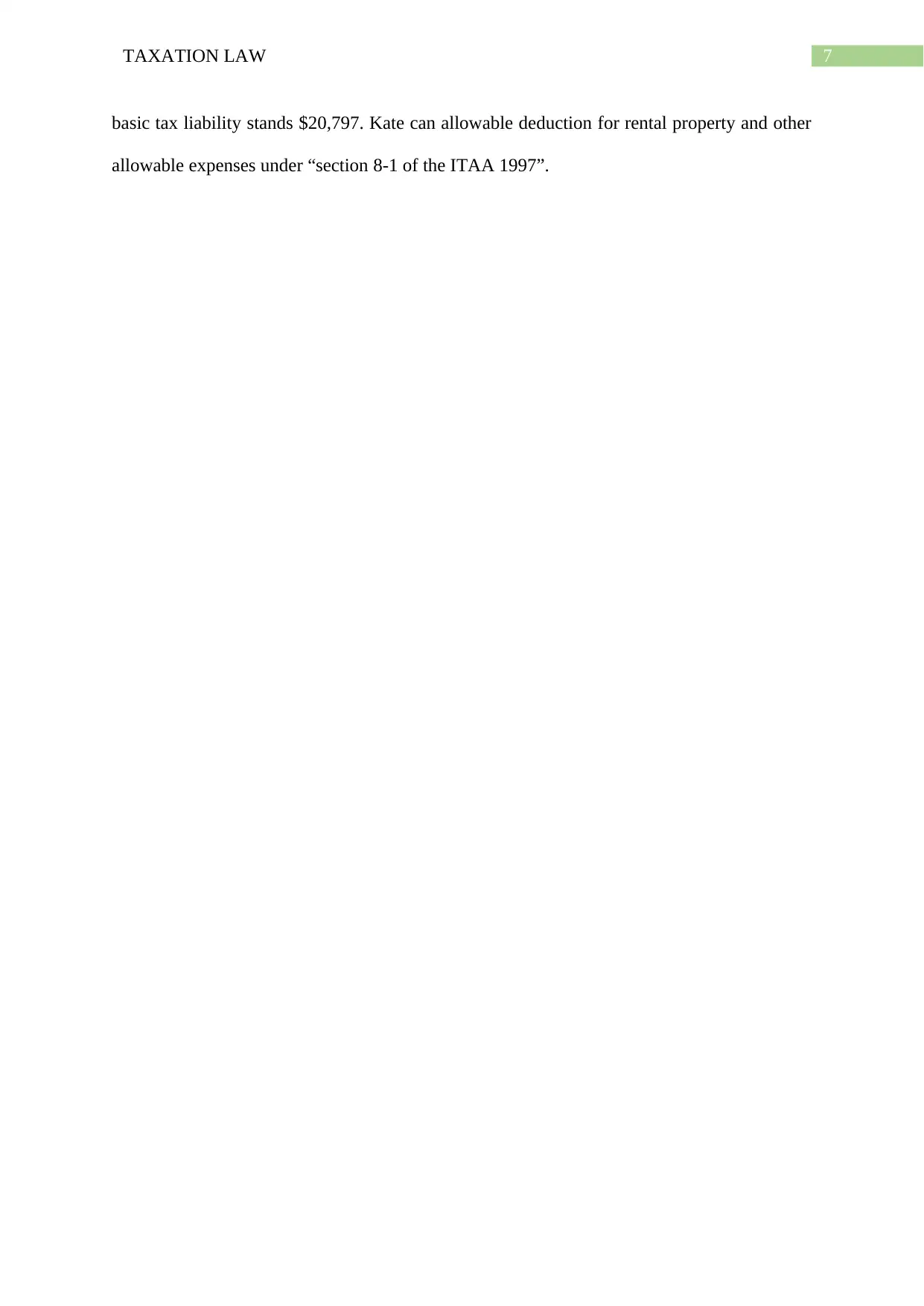
7TAXATION LAW
basic tax liability stands $20,797. Kate can allowable deduction for rental property and other
allowable expenses under “section 8-1 of the ITAA 1997”.
basic tax liability stands $20,797. Kate can allowable deduction for rental property and other
allowable expenses under “section 8-1 of the ITAA 1997”.
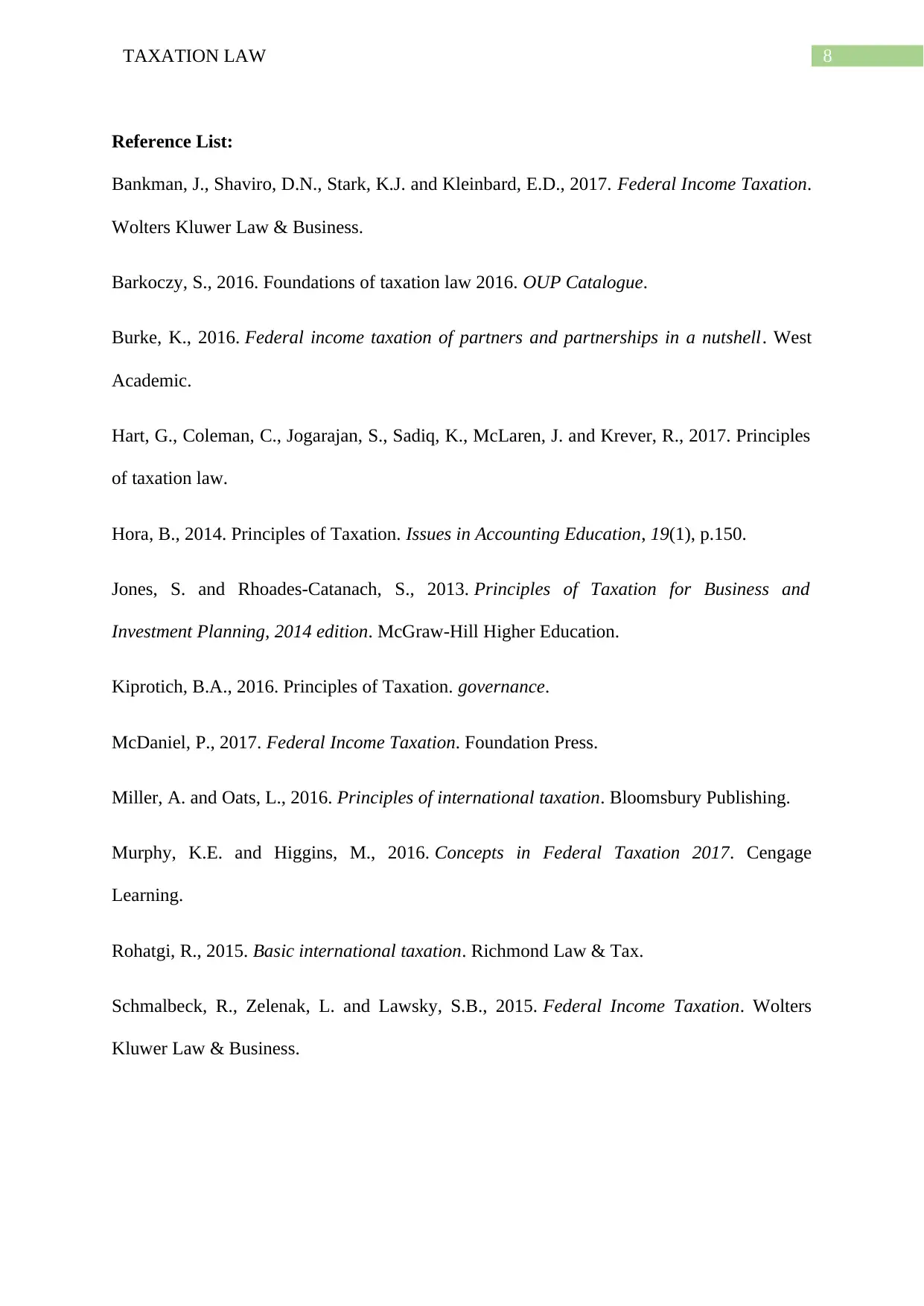
8TAXATION LAW
Reference List:
Bankman, J., Shaviro, D.N., Stark, K.J. and Kleinbard, E.D., 2017. Federal Income Taxation.
Wolters Kluwer Law & Business.
Barkoczy, S., 2016. Foundations of taxation law 2016. OUP Catalogue.
Burke, K., 2016. Federal income taxation of partners and partnerships in a nutshell. West
Academic.
Hart, G., Coleman, C., Jogarajan, S., Sadiq, K., McLaren, J. and Krever, R., 2017. Principles
of taxation law.
Hora, B., 2014. Principles of Taxation. Issues in Accounting Education, 19(1), p.150.
Jones, S. and Rhoades-Catanach, S., 2013. Principles of Taxation for Business and
Investment Planning, 2014 edition. McGraw-Hill Higher Education.
Kiprotich, B.A., 2016. Principles of Taxation. governance.
McDaniel, P., 2017. Federal Income Taxation. Foundation Press.
Miller, A. and Oats, L., 2016. Principles of international taxation. Bloomsbury Publishing.
Murphy, K.E. and Higgins, M., 2016. Concepts in Federal Taxation 2017. Cengage
Learning.
Rohatgi, R., 2015. Basic international taxation. Richmond Law & Tax.
Schmalbeck, R., Zelenak, L. and Lawsky, S.B., 2015. Federal Income Taxation. Wolters
Kluwer Law & Business.
Reference List:
Bankman, J., Shaviro, D.N., Stark, K.J. and Kleinbard, E.D., 2017. Federal Income Taxation.
Wolters Kluwer Law & Business.
Barkoczy, S., 2016. Foundations of taxation law 2016. OUP Catalogue.
Burke, K., 2016. Federal income taxation of partners and partnerships in a nutshell. West
Academic.
Hart, G., Coleman, C., Jogarajan, S., Sadiq, K., McLaren, J. and Krever, R., 2017. Principles
of taxation law.
Hora, B., 2014. Principles of Taxation. Issues in Accounting Education, 19(1), p.150.
Jones, S. and Rhoades-Catanach, S., 2013. Principles of Taxation for Business and
Investment Planning, 2014 edition. McGraw-Hill Higher Education.
Kiprotich, B.A., 2016. Principles of Taxation. governance.
McDaniel, P., 2017. Federal Income Taxation. Foundation Press.
Miller, A. and Oats, L., 2016. Principles of international taxation. Bloomsbury Publishing.
Murphy, K.E. and Higgins, M., 2016. Concepts in Federal Taxation 2017. Cengage
Learning.
Rohatgi, R., 2015. Basic international taxation. Richmond Law & Tax.
Schmalbeck, R., Zelenak, L. and Lawsky, S.B., 2015. Federal Income Taxation. Wolters
Kluwer Law & Business.
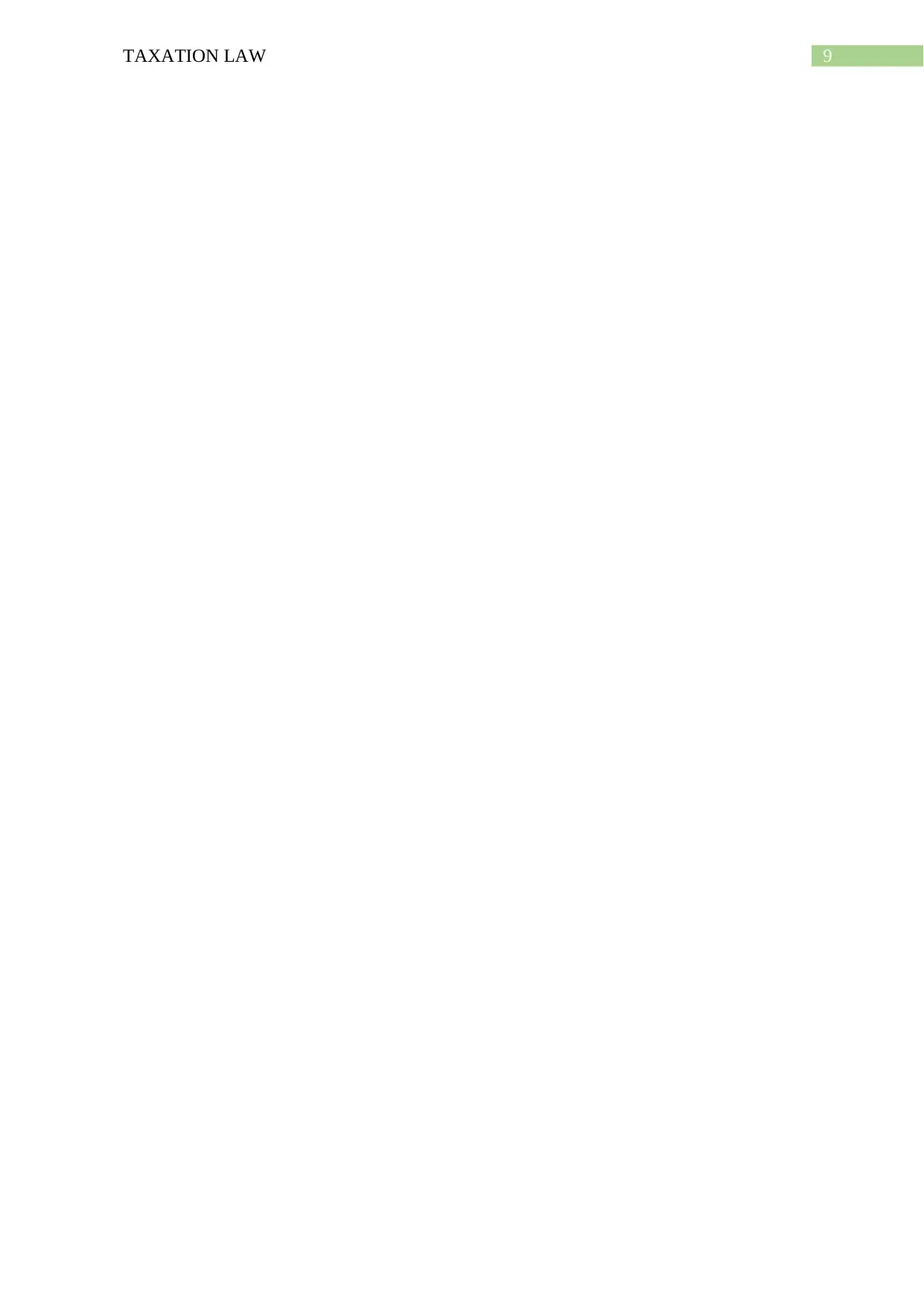
9TAXATION LAW
1 out of 10
Related Documents
Your All-in-One AI-Powered Toolkit for Academic Success.
+13062052269
info@desklib.com
Available 24*7 on WhatsApp / Email
![[object Object]](/_next/static/media/star-bottom.7253800d.svg)
Unlock your academic potential
© 2024 | Zucol Services PVT LTD | All rights reserved.





